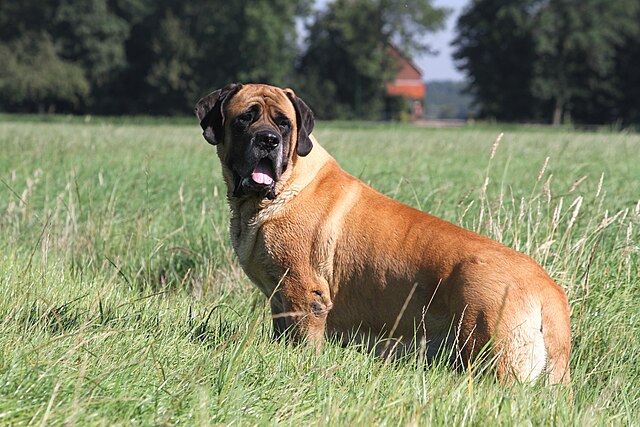


The Mastiff is a large, powerful breed that is known for its strength, protective instincts, and gentle nature with family members. Despite its imposing size, the Mastiff is often described as a sweet and calm companion. Originally bred for guarding and protecting property, livestock, and people, the Mastiff’s loyal and protective nature makes it an excellent family dog when properly trained. The breed’s muscular build and large stature make it a formidable presence, but its loving and affectionate demeanor with its family is what endears it to many dog owners.
The Mastiff breed has a long and storied history that dates back over 2,000 years. Its roots are believed to trace back to ancient civilizations, including the Romans, Greeks, and Egyptians, where these large dogs were used for guarding, hunting, and as war dogs. Mastiffs were particularly valued in Britain, where they were used to protect estates, guard livestock, and fight in battles. Over time, the breed was refined, and today’s Mastiffs are primarily known for their role as protective companions and guardians. Despite their tough history, the modern Mastiff is a friendly, loyal, and devoted family dog.
The Mastiff is a giant breed, known for its imposing size and muscular frame. Typically, males stand around 30 inches (76 cm) at the shoulder and weigh between 110 to 150 pounds (50 to 68 kg), while females are slightly smaller. The breed’s coat is short and dense, and it comes in a variety of colors, including fawn, brindle, and apricot. Mastiffs have a broad, square head with a strong jaw, and their eyes are dark and expressive. The breed's large, muscular body gives it an intimidating appearance, but its calm demeanor is often a contrast to its size. The tail is thick and tapers towards the end, usually carried low and straight.
The Mastiff is known for its calm, gentle, and loyal temperament. Despite its intimidating size, this breed is generally friendly and affectionate with its family. Mastiffs are protective and can be reserved or aloof with strangers, but they are not typically aggressive. They are good with children and other pets, especially if they have been raised with them from an early age. Mastiffs are also highly intelligent and can be independent-minded, which means they require consistent training and leadership. They are often described as "gentle giants" because of their loving nature and desire to please their owners.
While the Mastiff is a large and powerful breed, its exercise needs are moderate compared to other active breeds. Due to their size, they are not as energetic as smaller, more active dogs, but they still require regular exercise to stay healthy and maintain a healthy weight. Daily walks and some time spent playing in a yard are usually sufficient to meet their needs. However, it's important not to over-exercise a Mastiff, especially when they are puppies, as their large bones and joints need time to develop properly. It's essential to provide mental stimulation as well, as this intelligent breed enjoys problem-solving and interactive play.
Training a Mastiff requires patience and consistency, as the breed can be independent and sometimes stubborn. However, Mastiffs are intelligent and eager to please, so they can be trained with positive reinforcement techniques. Early socialization is crucial to ensure that the Mastiff grows up to be well-mannered and confident in a variety of situations. Introducing them to different environments, people, and other animals while they are young will help them develop into well-adjusted adults. Due to their protective nature, Mastiffs may be wary of strangers, so early training to help them distinguish between friendly visitors and threats is important.
The Mastiff is generally a healthy breed, but it is prone to certain health issues due to its large size. Some common health concerns include hip dysplasia, elbow dysplasia, heart conditions, and bloat (gastric torsion). Regular veterinary check-ups are essential to monitor for these issues, especially as the dog ages. The breed’s short coat is relatively easy to maintain, but it does shed moderately, so regular brushing will help keep loose hair under control. Due to the Mastiff’s size, it is important to monitor their diet to prevent obesity, as they can gain weight quickly if overfed. Additionally, regular dental care, such as brushing teeth, is important for maintaining overall health.
The average lifespan of a Mastiff is 8 to 10 years. As with all large dog breeds, Mastiffs tend to have shorter lifespans compared to smaller breeds. Proper care, including a balanced diet, regular exercise, and routine veterinary visits, can help ensure that a Mastiff lives a long, healthy, and happy life. Due to their predisposition to certain health conditions, it is especially important to monitor their health as they age and seek veterinary attention if any issues arise.